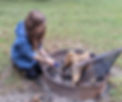OUR METHODS
Multi-Graded Classrooms
Children develop at their own pace, in complex and unique ways. To support this, Bloom Community School uses multi-age classrooms: PODS (K-2nd), SPROUTS (3rd-5th), and BLOSSOMS (6th-8th). This allows children to progress naturally along the learning continuum, advancing when developmentally ready. The three-year teacher placement in multi-age classrooms provides teachers with extended time to monitor skill development and create increasingly complex learning experiences. It also allows older students to mentor and support their younger classmates.


Science of Reading
Bloom Community School uses systematic language instruction, focusing on phonemic awareness (letter sounds) and sequential lessons with a multi-sensory approach, . We weave this instruction through our daily work, working with the components of language not only during our direct lesson time, but during our project-based learning units, games, and discussions about story and literature.

Social Emotional Learning
Research consistently demonstrates the positive impact of social-emotional learning. Similar to the benefits of outdoor time, mindfulness practices are linked to improved attention and executive function, reduced ADHD symptoms and disruptive behaviors, increased calm, social-emotional awareness, and self-regulation, and enhanced self-esteem and well-being. Social-emotional education provides a crucial foundation for children to navigate their world and engage in meaningful learning.
Outdoor Learning
Outdoor time offers significant benefits for children. It boosts physical health, improves concentration, enhances cognitive function and creativity, and aids information retention. It also reduces stress and promotes well-being. Recognizing the importance of outdoor experiences, we provide ample opportunities for outdoor play throughout the school day, including multiple recess breaks and outdoor learning experiences.

Play-Based Learning
Play-based learning starts with the understanding that play is crucial for learning. Play creates an enjoyable atmosphere, making children receptive to learning. In a carefully designed environment with thoughtfully curated materials, children explore, problem-solve, ask questions, and build connections. Meaningful play requires time and nurturing. At Bloom, we provide ample playtime so children can develop curiosity, practice social-emotional skills, and make sense of the world around them. We believe learning should be fun, and play facilitates deeper understanding through joy and engagement.


Project-Based Learning
Project-based learning centers around real-world opportunities, like compelling questions or social issues, to structure teaching and curriculum. This allows students to deeply engage with a project over an extended period. It integrates essential learning standards (e.g., Illinois Learning Standards) through hands-on activities.
Students take ownership of their learning by helping define project goals and outlining the steps to achieve them. Projects are designed around student interests and developmental abilities, and can last from six weeks to a semester. Project tasks and objectives are woven into lessons, small and large group instruction, and independent work.



